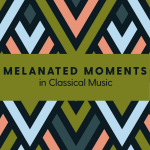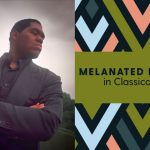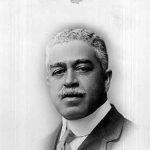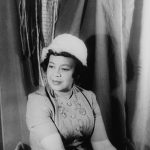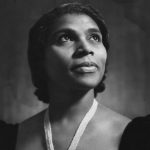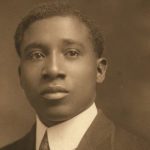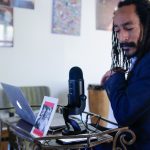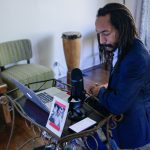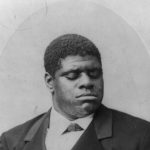Melanated Moments, S2E3: Middle Passage Maestro – Ignatius Sancho
Joshua and Angela reflect on the amazing life and music of Ignatius Sancho, who was born on a slave ship and orphaned shortly thereafter. Through dedication and application, he escaped the institution of slavery and made a huge contribution to the arts, including many great classical compositions.
Featured Music:
“Minuetto 2,” from Minuets, Cotillons and Country Dances by Ignatius Sancho
“Minuet No. 10,” by Ignatius Sancho
Music Plays (00:05): [MMCM Theme] Joshua Thompson (00:14): Hello to everyone out there listening in the land of podcasts. I’m Joshua Thompson… Angela Brown (00:20): And I’m Angela Brown…. And this is Melanated Moments in Classical Music. Joshua, this season has really been so much fun as we continue to do a deep dive into the wide world of classical music from composers of African descent. Joshua Thompson (00:39): Yes! You know, we really have. So many brilliant guests, from all over the country, have helped us grow and learn more about this fascinating subject matter. And today, we’re gonna continue that deep dive with another name and set of musical selections that are certain to get folks thinking about classical music, world history and the African diaspora in a more expansive way. Angela Brown (01:06): Joshua, man…whenever you start a show like that, I already know we’re about to get a history lesson. Lord, come on! Joshua Thompson (01:16): And you right, you right! So, shall we get to it? Angela Brown (01:20): Come on baby! Professor Thompson, who’s on deck today? Joshua Thompson (01:25): Well, today we are going to be talking about Ignatius Sancho. Is this a name that you’ve heard or no? Angela Brown (01:33): I have heard of this name before, but tell us more about him. Joshua Thompson (01:37): Awesome! Glad you have because I didn’t, until recently. And so I was just super intrigued. So let me give you a little bit of background. So, Ignatius Sancho was born in 1729 and then he died in 1780, but– get this–he was born on a slave ship during the Middle Passage. So yeah, girl, we gone get to it. I told you– we gone get to it. So for those who aren’t aware, the Middle Passage is also known as the Triangular Trade, right? So we’re going from West coast of Africa, where slaves are being boarded on ships and dropped off at ports, around the globe. Right? So that’s what that is. So his mother died early in his life–I think during childbirth– and kind of a harsh reality is: his father chose to commit suicide by jumping overboard on this slave ship, rather than living a life as an enslaved person. Angela Brown (02:35): Can you imagine being an innocent baby whose mama dies to bring him in the world on a slave ship that’s taking him from freedom of his mama’s womb, to being enslaved in a new country– well, country that he only will know– and his father also commits suicide. I mean… Joshua Thompson (02:55): And it’s just– it’s wild, right? Because this is not, probably, the only story– you know–the only, isolated story that goes like this. I promise though, there is a silver lining, and we’re going to hear it. So, let me kind of wrap up some other things about, uh, Mr. Sancho, despite all of that, right. That’s how he started in life. He goes on to become an amateur composer, an actor, a writer, an essayist, and an abolitionist, as well as an entrepreneur and any business owner. So as far as I’m concerned, this man is the consummate artist and Renaissance man, ’cause he does everythang! Sancho is actually credited with documenting one of the very first, uh, historical written accounts of slavery in Europe, and we’ll get to that in just a little bit. So, um, because of that, being an abolitionist, a business owner–because things are a little bit different in Britain, right? They abolished slavery well before the United States did. Don’t mean that they, you know, was treatin’ folks, right? But at least they were not packing ships and whatnot. So he’s believed to be the first person of African descent to vote in a British election because he is a man, and he is a property owner, right. He owns his own business, so he can do these things, casting votes and whatnot. And it’s this continued self-education and all this stuff that really heightens his awareness of societal inequities and really prompts and sets up his whole life about emancipating himself and others. So just– just a super fascinating guy. Angela Brown (04:28): Sounds like it. Ugh, I don’t even know where to begin with this. Before we even get to the music, I got a few questions! Joshua Thompson (04:37): Here’s the deal. I love that you do. I love that you got the questions, and I get it. So if you ask away, I promise I will do my best. So you’re up witcha questions! Angela Brown (04:47): Uh, well, um, where were his parents captured from? Joshua Thompson (04:51): Right. So, you know, a lot of the things I’ve been reading says, ‘he’s born on this slave ship’ and I’m like, “well, where is his parents?” It is believed, from historical accounts and research, off the coast of West Africa in Guinea. And so that’s kind of what we know. And we’re basing some of this from a biography on Ignatius Sancho, um, that was published in 1782, by the name of Joseph Jekyll. I will say this, uh, more evidence is showing that Mr. Jekyll’s biography, perhaps, is not so accurate. And the way we know this is because Ignatius Sancho was like, “No, Mr. Jekyll, I, in fact, did not say that,” right. So we have to get a little bit– not creative, but we have to do our due diligence when we research pre-colonial composers of African descent. ‘Cause we know who’s writing history, and it ain’t Black people. Right? So there’s– hopefully that answers the question. Angela Brown (05:44): That did, that did. Um, but I have another one. Um, so where was Sancho sold? Joshua Thompson (05:50): So again, it goes back to: On the Middle Passage, there’s this Triangle of Trade, right? And so you have the French West Indies, like Guadalupe and Haiti and all these things, and then you have, what’s known as, um, a new colony, owned by Spain. It’s called New Grenada. And so in modern times, if we were trying to figure out where this place is, think of countries of Panama, Colombia, Ecuador, Venezuela, Guyana, Suriname, right. ‘Cause South America, as we know it, is being formed through colonization right around 1717. Right? Um, and so that’s how we know. I think, more specifically, where he was growing up is right around Cartagena, which is in Columbia. There are records of him being baptized at age two by the Bishop. Um, but he doesn’t stay. Yeah. He doesn’t stay in new Grenada very long ’cause he’s a slave, right. Unfortunately, he is an enslaved person. He is sold and, um, his slave masters put ’em on another boat, and he hikes all the way back over to England, to Greenwich, where he stays as a, uh, as a house slave for about 18 years. Angela Brown (06:59): So as a slave, they allowed him to be baptized at two. That’s interesting. Joshua Thompson (07:03): Well– ’cause ya gotta understand, right– let’s think about it. He’s from West Africa. Ignatius Sancho was not a West African name. Right. Angela Brown (07:11): Well, no. Joshua Thompson (07:13): Right, right. The Catholic Church is part of this whole crusades and colonialism. And so, you know, it’s very Roman Catholic. And so it’s one of those: let’s give him a Roman Catholic name to totally erase his West African heritage and frame him as a, well, you know, Western European or that type of stuff, you know? Um, that’s why it’s important. There’s a lot in a name. Angela Brown (07:34): Okay. Alright. So, so now he’s in Greenwich where he stays for 18 years as a house slave. How did Sancho, as a house slave, develop artistically and politically? Joshua Thompson (07:53): You know, what we would say, uh, ‘with a little help from our friends’, I guess. So he’s self-educated at this point, and what I understand is one of his neighbors, or one of the neighbors on this street is, is a Duke. It’s a Duke and Duchess of Montague, and they noticed this, this kid is really inquisitive. And so they’re feeding him books and music and, and, um, taking him to the theater and reading plays because– you’re really not supposed to be doing that. That’s almost punishable by death. Blacks aren’t even supposed to be able to read, let alone write. But, um, they see the value, that this guy is just so brilliant and so smart. They help him emancipate himself. Um, and then he actually becomes a domestic servant and a valet for the Duke and the Duchess. And so that’s where he’s able to freely read, freely write, and be a part of– at this time, this is the Age of Enlightenment in Europe, if you’ve heard of that term– and he’s, he becomes part of all that. And, uh, you know, he’s a good writer, and he starts writing all these essays about abolitionism and really posing to Britain that, you know, slavery is really morally wrong, right. Gets famous, gets popular for those types of things and becomes a part of like this Black middle class in England. And, that’s where it really, really begins for him. So, you know how I do Angela! I always give you a little history lesson and right when I see your eyes glazing over, I’ma let you come up for a break. Unison (09:27): [Laughter] Angela Brown (09:29): Well, I think we should take one and listen to a little of his music. Joshua Thompson (09:34): Let’s do it. And here’s what I want to think– Um, so it’s one of his minuets. And so we’ve set this context for: born on a slave ship and this kind of unsavory, unpleasant upbringing. Just listen to what comes out of it though, because you would never think, by listening to this music, that it comes with all of this history. So let’s take a listen. Music Plays (09:54): [Ignatius Sancho, “Minuet No. 2”] Joshua Thompson (11:40): So– I don’t know. Just your first thoughts, Angela, what do you think? Angela Brown (11:43): Well, I loved it. I mean, it reminded me of music that I, I would associate with Mozart or Chevalier, or, uh, you know, some kind of minuets, waltz’s–just, as it’s a minuet. And it also brought to mind that while he was in the Age of Enlightenment in Britain, um, if he was in America and a little, little more down the line, he would have been a Renaissance man in Harlem, you know. He would’ve been Cat-daddy, number one! Joshua Thompson (12:19): You got it, you got it. You bring up a couple of really good points and really good names. You said, you know, ‘Hey, sounds like something I would listen to with Mozart, or it sounds like Chevalier de St. George’. And there’s a reason: they’re all contemporaries. Um, there’s another guy who’s composing and playing at this time, um, the famous British violinist George BridgeTower, um—Black violinist. These are all contemporaries, and Sancho is very much writing as a reflection of the time period in which he’s in, right? So there’s a reason why he sounds almost indistinguishable from a Mozart: because he doesn’t want to, right? He’s an abolitionist. He is advocating for the inherent understanding that Black people are equal and able to have enlightened thoughts and composition. So he’s not trying to do anything other than prove he belongs squarely within this field. But I think it’s interesting– he’s an amateur composer. Angela Brown (13:23): So what you’re saying: he’s trying to conform, to not stick out, even though he can’t help but stick out cause he Black and he’s playing minuets! Joshua Thompson (13:32): I think that’s what it is, but I wouldn’t say conform. Right? Because just by the nature of who he is, he is already kind of a rebellious thing, but he’s taking convention and just being himself, he’s able to make conventional things a little bit less conventional. Does that make sense? Maybe not. Um– Angela Brown (13:55): I mean, it makes sense, but– if that’s the way you want to see it… Gone spin it, boy, gone spin it! Joshua Thompson (14:04): I love that! So, like I said earlier, he’s an amateur composer, and that’s what he says too. So if you’re looking in the history books, I think it’s great that we are elevating his works– cause there was a lot of them, and we’ll get to another one. But if you really want to get to the meat of his work and what he was really, really lauded and celebrated for, you’re gonna read his books, and you’re gonna read his essays on abolition and– on, as they call it, the Negro in, um, in colonial America or– in colonial Europe, that’s what you’re going to really hear about him. But while we have you all here, I want to hear his, Minuet No.10. The arrangement I have for this, I enjoy it because it is solo classical guitar, and there is nothing I love more than finger-picking guitar. Oh, it’s gorgeous. Yeah. Angela Brown (14:54): All right, now! I love a guitar. Let’s hear this. Joshua Thompson (14:58): Yeah! Minuet No.10, by Ignatius Sancho. Music Plays (15:01): [Ignatius Sancho, “Minuet No. 10”]. Joshua Thompson (15:52): Told you! Unison (15:53): [Laughter] Angela Brown (15:56): You know, I love the music that you choose when you select the people that we listen to on this podcast, because it is so totally– it’s clean. You hear what they were thinking. It’s not all clouded up with a bunch of things. It’s just simple. It lays like a submissive puppy on your lap. And you just enjoy it. Joshua Thompson (16:19): I love that you say that– simple, right? Because if we look at literature, uh, musical literature and just regular literature about The Enlightenment, it’s about order, reason, and balance. We’re not really big on ornate. We’re not really big on like the stuff that came before it, and simple was anything but, right? The simplest things, sometimes, are not simple. I love this piece. It is relaxing. And it’s one of those– when you say, ‘Hey, I think of classical music, I think of Mozart’. I’m like, listen to this. I look forward to the day when Ignatius Sancho’s name falls out of people’s mouths just as regularly, if not more so, than Mozart when they think of classical music. That’s my hope for this, uh, for this segment and for this composer, who’s writing fun music and, and very period piece music at a time when the world does not want him to be a part of the drive and the push of creative and cultural genius. This has been fun, but we gotta go. So, I’m Joshua Thompson… Angela Brown (17:26): And I’m Angela Brown. Unison (17:27): And this has been Melanated Moments in Classical Music. Joshua Thompson (17:36): Season two of Melanated Moments in Classical Music was made possible by the Indianapolis foundation, a CICF affiliate. We thank them for their generous support. Angela Brown (17:47): Melanated Moments in Classical Music is proud to partner with The Coalition for African-Americans in the Performing Arts and Morning Brown Incorporated. Joshua Thompson (17:58): Melanated Moments in Classical Music is a production of Classical Music Indy. Our producer is Ezra Bakker Trupiano. Our theme music was composed by Laura Karpman.
LOCAL CLASSICAL – MELANATED MOMENTS SEASON SIX
As we continue celebrating Black Music Month, this week’s playlist will feature music and artists discussed during the latest season of Melanated Moments in Classical Music. All of season six was recently released and featured vibrant discussions about artists such as Scott Joplin, Hazel Scott, Joseph Bologne, and Kenneth Overton, among others.
LOCAL CLASSICAL – BLACK MUSIC MONTH
In this week’s playlist, we celebrate Black Music Month which takes place in June. It was created by President Jimmy Carter in 1979 to honor and celebrate Black artists’ contributions to music. We’ll be honoring the late Herman Whitfield III, an Indianapolis native who was a gifted pianist and composer. We’ll also hear performances of artists who have been featured in season four of Classical Music Indy’s podcast, Melanated Moments in Classical Music.
LOCAL CLASSICAL – MELANATED MOMENTS
In this week’s Black History Month playlist, we bring you recordings by composers, performers, and artists who have been highlighted in our podcast, Melanated Moments in Classical Music. Melanated Moments is the ward-winning podcast from Classical Music Indy that shines a spotlight on musical works composed by, for, and about Black people.
LOCAL CLASSICAL – HOST OKARA IMANI
Hey, Starshine! This is Okara Imani, Media Production Fellow for Classical Music Indy, and your guide to The “I” in Classical Music. I’m here to highlight the cultural and social intersections of the classical art form, beyond the Classical Period and beyond the constructs of Euro-centric high society origins.
Ric’key Pageot: Inspiring a Moment to Learn, Acknowledge, and Respect
Ric’key Pageot: Inspiring a Mo …
Ignatius Sancho: Composing the Hypocrisy of Colonialism & Convention
Ignatius Sancho: Composing the …
NEW CLASSICAL – DR. BILL BANFIELD
This week we bring you the music of Dr. Bill Banfield. Dr. Banfield is an award-winning composer whose symphonies, operas, chamber works have been performed and recorded by major symphonies across the country. Few have a wider, performed professional composing output, that has had public concert performances, reviews, radio, recordings of some 12 symphonies, 7 opera, 9 concerti, chamber, jazz, and popular forms. This alone making Dr. Banfield one of the most performed, recorded composers of his generation. In 2010 and 2016, Dr. Banfield served as a Pulitzer Prize judge in American music.
#AmplifyMelanatedVoices
Classical Music Indy stands with our Black community. We are here to listen, learn, and lend our support. We believe that classical music is powerful; that it evokes a range of human emotions and creative expression.
Angela Brown Brings her Unbridled Zeal to a New Podcast.
Angela Brown brings her unbrid …

